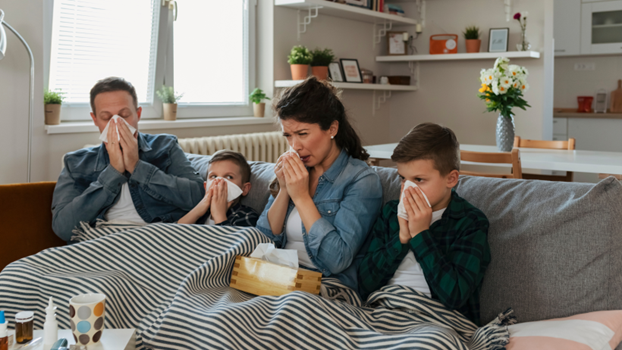Flu Preparedness: Tips to Keep You and Your Family Healthy
September marks the beginning of flu season in many areas, ushering in heightened vigilance as healthcare systems gear up to face the annual influenza challenge. Emergency departments might see early cases, sounding an alarm for medical professionals. As the seasons change, so does the risk of contracting the flu.
Influenza, commonly known as the flu, is a contagious respiratory illness that can lead to mild to severe symptoms and, in some cases, even hospitalization or death. According to the Centers for Disease Control and Prevention (CDC), each year in the United States, 5% to 20% of people get sick from the influenza virus, and many will seek medical care in ambulatory healthcare settings (e.g., pediatricians’ offices, and urgent-care clinics).
We will explore together the various aspects of flu preparedness, from vaccination to everyday hygiene practices, to help you stay healthy and minimize the flu’s impact on your life.
The Most Important Step – If Eligible, Get Vaccinated
Getting the flu vaccine is the first step in being prepared for the virus. Flu vaccines are not just for adults; it’s recommended for children, too. Ensure all eligible family members, including children and seniors, receive annual flu shots. It’s crucial for children, as they can quickly spread the virus in school and daycare settings.
Being informed about influenza is especially important for certain groups at high risk for complications, including pregnant women, people over 65, and those with weakened immune systems and underlying health conditions. These groups should take extra precautions to avoid getting sick from the flu by following recommended guidelines such as frequent hand washing and staying away from large crowds.
Common Symptoms and Emergency Signs
Understanding the symptoms of the flu is crucial for early detection, severity of the illness, and related treatment.
Common symptoms include fever, chills, cough, sore throat, runny or stuffy nose, muscle or body aches, headaches, fatigue (tiredness), and sometimes vomiting and diarrhea. It’s vital for people who are at high risk for complications from the flu to be aware of the emergency signs – difficulty breathing or shortness of breath, chest pain or pressure, sudden dizziness, seizures, and severe or persistent vomiting.
If you get sick, it’s wise to seek medical care quickly. Emergency departments can often provide rapid treatment or diagnosis of influenza, and they have protocols to keep patients safe from spreading the infection to others.
Healthcare professionals might also recommend antiviral medications, which can reduce the severity and duration of symptoms.
Tips To Avoid Contracting the Flu Virus
Practice Good Hygiene
Preventing the spread of the flu starts with good hygiene. Encourage everyone in your household to wash hands frequently with soap and water for at least 20 seconds. Use hand sanitizer with at least 60% alcohol if soap and water are unavailable. It’s advisable to cover their mouth and nose with a tissue or elbow when coughing or sneezing. Dispose of used tissues properly and wash hands immediately and avoid touching their face, especially their eyes, nose, and mouth.
Maintain a Clean Environment
Flu viruses can survive on surfaces for several hours, so keeping your home and workspace clean is vital. Focus on high-touch surfaces like doorknobs, light switches, countertops, and remote controls. Regularly disinfect these areas using household cleaners that are effective against viruses.
Stock Up on Supplies
In case you or a family member falls ill, having essential supplies on hand is a good idea. Stock up on decongestants and cough syrup. Keep thermometers handy to monitor body temperature. Buy tissues, masks, and hand sanitizers to reduce the spread of germs within the household. It would help if you also stocked up on non-perishable foods and fluids to stay nourished and hydrated while recovering.
Boost Your Immune System
A strong immune system can help your body fight off infections more effectively. Encourage a healthy lifestyle within your family by eating a balanced diet. It’s also wise to exercise regularly and get enough sleep to allow your body to rest and recover. Practice relaxation techniques like meditation or yoga to reduce stress levels.
Practice Social Distancing
Consider practicing social distancing during flu season, especially if there’s a significant outbreak in your area. Limit close contact with people who are sick and avoid crowded places. It reduces the chances of exposure to the virus.
Stay Informed
Stay informed about the latest flu outbreaks and health recommendations in your area. Follow updates from reputable sources such as the Centers for Disease Control and Prevention (CDC) or the World Health Organization (WHO). Knowing the current situation can help you make informed decisions about activities and travel during flu season.
Plan for the Worst
While we hope for the best, preparing for the worst is essential. Create a contingency plan in case multiple family members become ill simultaneously. Identify a caregiver, friend, or family member who can help with groceries, childcare, or other essential tasks.
Let’s Be Prepared and Stay Healthy During Flu Season
Flu preparedness is a year-round effort that can significantly impact your family’s health and well-being. While we can’t always avoid the flu entirely, we can take steps to prepare ourselves and our families for flu season. Remember that prevention is vital, so take proactive steps to stay healthy and flu-free during the upcoming season.
In case of any doubt or if you suspect a medical emergency, do not hesitate to call 911 or seek immediate medical attention, as early intervention can be critical in ensuring the best possible diagnosis and treatment.
Works Cited
Centers for Disease Control and Prevention. “Flu Symptoms & Complications.” CDC, https://www.cdc.gov/flu/symptoms/symptoms.htm.
Mayo Clinic. “Flu (Influenza).” Mayo Clinic, https://www.mayoclinic.org/diseases-conditions/flu/symptoms-causes/syc-20351719.
WebMD. “Flu Emergencies: When to Call the Doctor.” WebMD, https://www.webmd.com/cold-and-flu/flu-emergencies-when-to-call-the-doctor.




